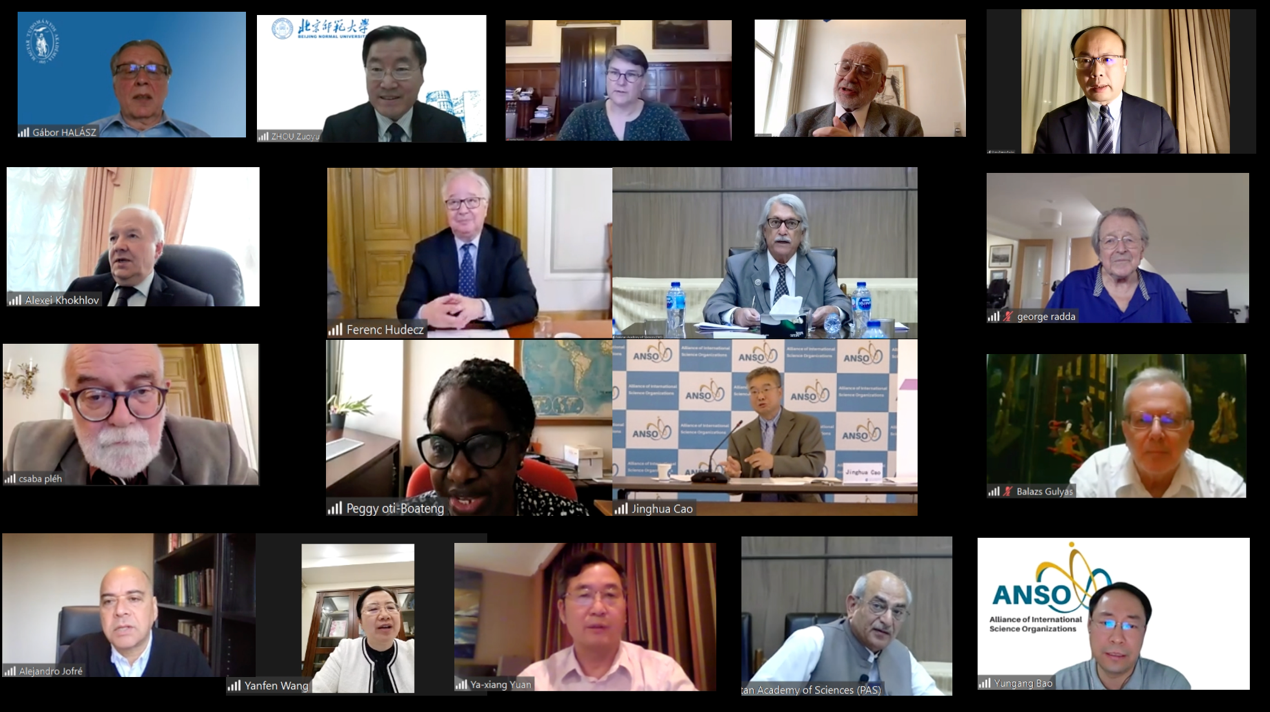Despite the wide recognition of the important role of fundamental science and higher education in nurturing new knowledge, the challenges faced by these sectors have been exacerbated by global crises and have taken on greater urgency due to the increased demand for innovation-led development and talent training. To discuss how to overcome these challenges and adopt innovation perspectives in extant higher education systems, the Hungarian Academy of Sciences (MTA), Chinese Academy of Sciences (CAS) and Alliance of International Science Organizations (ANSO) co-hosted the “ANSO Online Open Conference on Fundamental Science and Higher Education” on 27-28 May 2021. More than 20 esteemed speakers from Europe, Asia and South America were invited to share their insights and ideas. The conference was live-streamed on YouTube and Bilibili, attracting over 500 audience members from across the world.
The event kicked off by Prof. Ferenc Hudecz, Vice President of the MTA, Prof. Qasim Jan, Vice President of ANSO, Pakistan Academy of Sciences, Prof. Peggy Oti-Boateng, Director of Division of Science Policy and Capacity-Building of UNESCO and Prof. Jinghua Cao, Executive Director of ANSO Secretariat, who together introduced the background of the meeting and the new movement of global higher education.
The challenges for maintaining quality education in universities for fundamental sciences, particularly funding, human resources and institutional regimes, were raised by Prof. Ivanka Popovic, Rector of the University of Belgrade (Serbia). Prof. Yaxiang Yuan, Academician and Professor of the Academy of Mathematics and Systems Science, CAS, shared parallel views and pointed out that the mathematical sciences are essential as they infiltrate almost all aspects of modern science and technology. Prof. Csaba Pléh, Co-Chair of Methodology of Science Education, Academia Europaea Budapest, presented his comprehensive comparison between fundamental science knowledge and the value systems of managers in Hungary by suggesting a new value system for promoting applied sciences at universities.
An analysis of different national and regional science policies was presented by a suite of speakers. Prof. Gábor Halász, Researcher of Eötvös Loránd University (Budapest), emphasized the importance of supra-national institutional cooperation by unraveling the European research policies and actions. Prof. Balázs Gulyás, President’s Chair in Translational Neuroscience, Nanyang Technological University (Singapore) and Prof. George Radda, University of Oxford and Former Chairman of the Biomedical Research Council (Singapore) introduced experiences and lessons from Singapore’s science policy journey by comparing it with other countries. Prof. Erhard Busek, Chairman of the Institute for the Danube Region and Central Europe indicated that Covid-19 has shed light on more ways of cooperating regionally and globally.
The conference highlighted that with current trends in the evolution of higher education, the integration of research and education is on the way. Prof. Yanfen Wang, Executive Vice President of the University of Chinese Academy of Sciences (UCAS) shared the new talent cultivation system implemented by UCAS to meet the demand for innovation-driven growth in China. Prof. Alejandro Jofré, Provost of Universidad de Chile, introduced the thinking behind the construction of the transdisciplinary framework behind the establishment of the CAREN PARK in Santiago. Prof. Anwar-ul-Hassan Gilani, Vice Chancellor of the University of Haripur (Pakistan) also shared his experiences of linking basic science to applied sciences in his research. Prof. Zhimin Chen, Vice President of Fudan University introduced the particulars of the plan for building a Fudan University campus in Budapest, Hungary in the near future.
The issues associated with training young scientists have become a priority for many countries in recent times. Prof. Alexei R. Khokhlov, Vice President of the Russian Academy of Sciences introduced the Russian approaches to encouraging students to get involved in scientific research. Prof. Zuoyu Zhou, Vice President of Beijing Normal University (BNU), discussed the management model for teaching and measuring talent cultivation at BNU. Prof. Yungang Bao from the Institute of Computing Technology/CAS presented his successful experiences in training under-graduate students in real chip development using Open Source Hardware.
In concluding remarks at the conference, representatives aired their opinions on integrating fundamental science with technology innovation through development of transdisciplinary perspectives and international cooperation. The conference ended with suggestions on how policy makers and private capital could improve the current higher education system.

